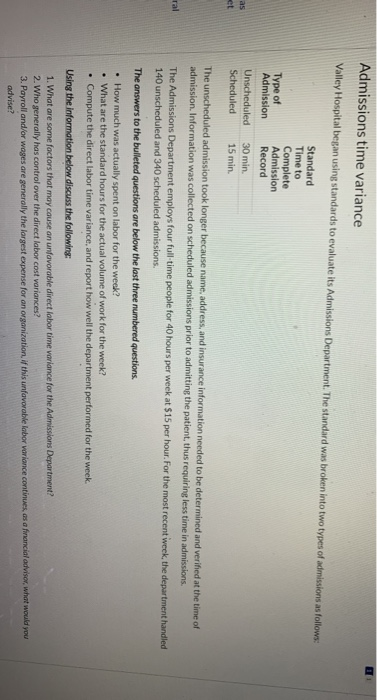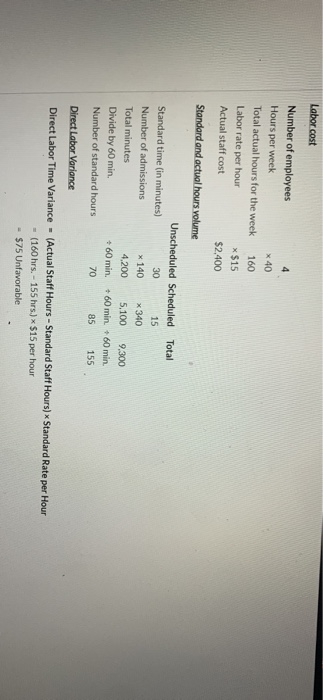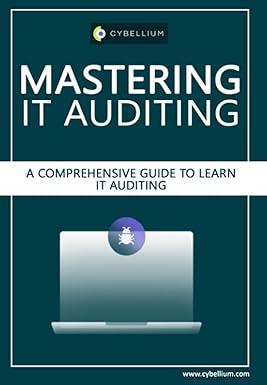Admissions time variance Valley Hospital began using standards to evaluate its Admissions Department. The standard was broken into two types of admissions as follows: Standard Time to Complete Admission Record Type of Admission Unscheduled Scheduled 30 min. 15 min et ral The unscheduled admission took longer because name, address, and insurance information needed to be determined and verified at the time of admission. Information was collected on scheduled admissions prior to admitting the patient, thus requiring less time in admissions. The Admissions Department employs four full-time people for 40 hours per week at $15 per hour. For the most recent week, the department handled 140 unscheduled and 340 scheduled admissions. The answers to the bulleted questions are below the last three numbered questions. How much was actually spent on labor for the weak? What are the standard hours for the actual volume of work for the week? Compute the direct labor time variance, and report how well the department performed for the week. Using the information below discuss the following: 1. What are some factors that may cause an unfavorable direct labor time variance for the Admissions Department? 2. Who generally has control over the direct labor cost variances? 3. Payroll and/or wages are generally the largest expense for an organization. If this unfavorable labor variance continues, as a financial advisor, what would you advise? Labor cost Number of employees 4 Hours per week x 40 Total actual hours for the week 160 Labor rate per hour * $15 Actual staff cost $2,400 Standard and actual hours volume Unscheduled Scheduled Total Standard time (in minutes) 30 15 Number of admissions * 140 x 340 Total minutes 4.200 5.100 9.300 Divide by 60 min. + 60 min + 60 min. 60 min. Number of standard hours 70 85 155 Direct Labor Variance Direct Labor Time Variance - (Actual Staff Hours - Standard Staff Hours) Standard Rate per Hour = (160 hrs. - 155 hrs.) x $15 per hour - $75 Unfavorable Admissions time variance Valley Hospital began using standards to evaluate its Admissions Department. The standard was broken into two types of admissions as follows: Standard Time to Complete Admission Record Type of Admission Unscheduled Scheduled 30 min. 15 min et ral The unscheduled admission took longer because name, address, and insurance information needed to be determined and verified at the time of admission. Information was collected on scheduled admissions prior to admitting the patient, thus requiring less time in admissions. The Admissions Department employs four full-time people for 40 hours per week at $15 per hour. For the most recent week, the department handled 140 unscheduled and 340 scheduled admissions. The answers to the bulleted questions are below the last three numbered questions. How much was actually spent on labor for the weak? What are the standard hours for the actual volume of work for the week? Compute the direct labor time variance, and report how well the department performed for the week. Using the information below discuss the following: 1. What are some factors that may cause an unfavorable direct labor time variance for the Admissions Department? 2. Who generally has control over the direct labor cost variances? 3. Payroll and/or wages are generally the largest expense for an organization. If this unfavorable labor variance continues, as a financial advisor, what would you advise? Labor cost Number of employees 4 Hours per week x 40 Total actual hours for the week 160 Labor rate per hour * $15 Actual staff cost $2,400 Standard and actual hours volume Unscheduled Scheduled Total Standard time (in minutes) 30 15 Number of admissions * 140 x 340 Total minutes 4.200 5.100 9.300 Divide by 60 min. + 60 min + 60 min. 60 min. Number of standard hours 70 85 155 Direct Labor Variance Direct Labor Time Variance - (Actual Staff Hours - Standard Staff Hours) Standard Rate per Hour = (160 hrs. - 155 hrs.) x $15 per hour - $75 Unfavorable








